Yi Jing Hexagram 28 - Line 3
The hexagram: 28
An hexagram is a combination of six yin and yang lines.
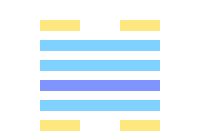
28.3 (28 > 47) - THE TÂ KWO HEXAGRAM.
The third line, undivided, shows a beam that is weak. There will be evil.
Bing DeepL Google Yandex28.3 (28 > 47) - Tá kvoh, le grand excès
Tá kvoh : 1. Grand excès, défaut, manquement ; 2. Traverser, dépasser.
Une poutre, un pilier trop faible (voir texte I) sont mauvais (ils ne peuvent supporter) (grand défaut).
Bing DeepL Google YandexThe trigrams
The trigrams are combinations of three yin and yang lines. The three bottom lines of the hexagram form the lower trigram and represent the inner situation. The three top lines form the upper trigram and represent the outer situation.
trigSup

Lower trigram: The wind The water


The nuclear hexagram: 1.2.4 (1 > 37)
The nuclear hexagram is the association of the two inner trigrams (lines 2,3,4 and 3,4,5). It represents the root, or the origin of the situation.
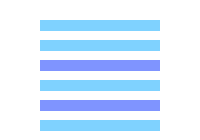
1.2.4 (1 > 37) - THE KHIEN HEXAGRAM
- 2. In the second line, undivided, (we see its subject as) the dragon appearing in the field. It will be advantageous to meet with the great man.
- 4. In the fourth line, undivided, (we see its subject as the dragon looking) as if he were leaping up, but still in the deep. There will be no mistake.
1.2.4 (1 > 37) - Don't leave too fast
One checks before leaving that they have given their loved ones what they need.
Bing DeepL Google Yandex1.2.4 (1 > 37) - Don't leave too fast
One checks before leaving that they have given their loved ones what they need.
Bing DeepL Google Yandex1.2.4 (1 > 37) - K’ien, la créativité
K’ien : principe actif, force vitale universelle.
-
2. Mais il apparaît, on le voit dans les champs. Les bienfaits font voir l’homme vraiment supérieur.
L’influence de la vertu se répand au loin avantageusement. -
4. Le dragon se remue (saute) dans l’abîme ; c’est bien. (Le prince sage exerce son action sur le monde.)
Il se répand au-dehors et avance.
1.2.4 (1 > 37) - Ne pas partir trop vite
On vérifie avant de partir qu'on a transmis à ses proches ce dont ils ont besoin.
Bing DeepL Google Yandex1.2.4 (1 > 37) - Fejlődés
- 2. Jó képességekkel rendelkezik és tanul.
- 4. Meg tudja nevezni a problémát.
The derived (Fan Yao)
The same line number on the mutated hexagram. It reperesents what can be done AFTER to correct the situation described by this line, as a sort of remedy or solution.
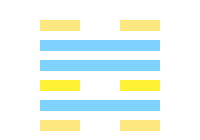
47.3 (47 > 28) - THE KHWĂN HEXAGRAM.
The third line, divided, shows its subject straitened before a (frowning) rock. He lays hold of thorns. He enters his palace, and does not see his wife. There will be evil.
Bing DeepL Google Yandex47.3 (47 > 28) - Being demoralised
One loses one' s means so one must ask for help from those whom one had neglected.
Bing DeepL Google Yandex47.3 (47 > 28) - Being demoralized
One loses one' s means so one must ask for help from those whom one had neglected.
Bing DeepL Google Yandex47.3 (47 > 28) - K’uán, la détresse
K’uán : détresse, abattement, dureté, sévérité, mauvais traitements.
Serré contre un rocher, poignant (pour se soutenir) dans des buissons pleins de grosses épines, ou rentrant dans sa maison et n’y trouvant pas sa femme (enlevée par des brigands). [Cas douloureux, mauvaise fortune. Com. II.]
Bing DeepL Google Yandex47.3 (47 > 28) - Être démoralisé
On perd ses moyens alors on doit demander de l'aide à ceux que l'on avait négligé.
Bing DeepL Google Yandex47.3 (47 > 28) - Kényelmetlenség
Elveszti az ítélőképességét, így meg kell kérnie azokat, akiket figyelmen kívül hagyott, hogy segítsenek.
Bing DeepL Google YandexThe juncture: 48.4
The derived of the reciprocal. It represents what could have been done BEFORE to prevent the situation described by this line, as a sort of remedy or solution.
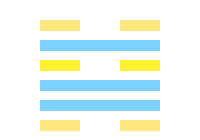
48.4 (48 > 28) - THE 3INGHEXAGRAM.
The fourth line, divided, shows a well,the lining of which is well laid. There will be no error.
Bing DeepL Google Yandex48.4 (48 > 28) - Returning to the source
One has paused to replenish the reserves.
Bing DeepL Google Yandex48.4 (48 > 28) - Returning to the source
One has paused to replenish the reserves.
Bing DeepL Google Yandex48.4 (48 > 28) - Tsing, le puits
Tsing : puits.
Un puits bien construit, citerné, est une chose de haute utilité.
Bing DeepL Google Yandex48.4 (48 > 28) - Retourner à la source
On a fait une pause pour reconstituer les réserves.
Bing DeepL Google YandexThe reciprocal: 28.4
The hexagram upside down. It represents the opposite situation, and as such is insturmental when validating comments.
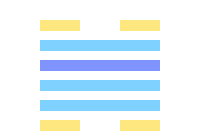
28.4 (28 > 48) - THE TÂ KWO HEXAGRAM.
The fourth line, undivided, shows a beam curving upwards. There will be good fortune. If (the subject of it) looks for other (help but that of line one), there will be cause for regret.
Bing DeepL Google Yandex28.4 (28 > 48) - Being weakened
One is supported by others but needs to recover.
Bing DeepL Google Yandex28.4 (28 > 48) - Being weakened
One is supported by others but needs to recover.
Bing DeepL Google Yandex28.4 (28 > 48) - Tá kvoh, le grand excès
Tá kvoh : 1. Grand excès, défaut, manquement ; 2. Traverser, dépasser.
Une colonne haute et forte est bonne ; toute autre est dangereuse (opposition à ce qui précède)
Bing DeepL Google Yandex28.4 (28 > 48) - Être affaibli
On a le soutien des autres mais on a besoin de récupérer.
Bing DeepL Google YandexMutations

28.3 (28 > 47) - THE TÂ KWO HEXAGRAM.
The third line, undivided, shows a beam that is weak. There will be evil.
Bing DeepL Google Yandex28.3 (28 > 47) - Tá kvoh, le grand excès
Tá kvoh : 1. Grand excès, défaut, manquement ; 2. Traverser, dépasser.
Une poutre, un pilier trop faible (voir texte I) sont mauvais (ils ne peuvent supporter) (grand défaut).
Bing DeepL Google Yandex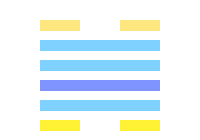
28.1.3 (28 > 58) - THE TÂ KWO HEXAGRAM.
- 1. The first line, divided, shows one placing mats of the white mâo grass under things set on the ground. There will be no error.
- 3. The third line, undivided, shows a beam that is weak. There will be evil.
28.1.3 (28 > 58) - Requiring more surveilance
One asks one's agents to keep an eye on the actions of others.
Bing DeepL Google Yandex28.1.3 (28 > 58) - Requiring more surveilance
One asks one's agents to keep an eye on the actions of others.
Bing DeepL Google Yandex28.1.3 (28 > 58) - Tá kvoh, le grand excès
Tá kvoh : 1. Grand excès, défaut, manquement ; 2. Traverser, dépasser.
-
1. Ceci est susceptible de deux explications : a. « S’appuyer sur des joncs » est un grand défaut ; ils plient et ne soutiennent pas. b. Pour placer un objet comme natte à offrande, se servir de mao blanc est fautif.
Note. Au lieu de gratter simplement la terre et l’aplanir.
(Le mao blanc représente la pureté, la droiture, kiet tche. Ceci d’après le commentaire représente un excès de précaution. Kwéh hu weï shin (1er sens). - 3. Une poutre, un pilier trop faible (voir texte I) sont mauvais (ils ne peuvent supporter) (grand défaut).
28.1.3 (28 > 58) - Réclamer plus de surveillance
On demande à ses agents de garder un œil sur les agissements des autres.
Bing DeepL Google Yandex28.1.3 (28 > 58) - Lemondás
- 1. Fejlődni akar a gyengeség miatt.
- 3. Ápolja kapcsolatait.
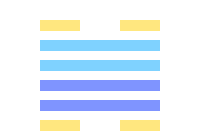
28.2.3 (28 > 45) - THE TÂ KWO HEXAGRAM.
- 2. The second line, undivided, shows a decayed willow producing shoots, or an old husband in possession of his young wife. There will be advantage in every way.
- 3. The third line, undivided, shows a beam that is weak. There will be evil.
28.2.3 (28 > 45) - Mediating
One is standing between those who want to fight it out.
Bing DeepL Google Yandex28.2.3 (28 > 45) - Mediating
One is standing between those who want to fight it out.
Bing DeepL Google Yandex28.2.3 (28 > 45) - Tá kvoh, le grand excès
Tá kvoh : 1. Grand excès, défaut, manquement ; 2. Traverser, dépasser.
- 2.
- 3. Une poutre, un pilier trop faible (voir texte I) sont mauvais (ils ne peuvent supporter) (grand défaut).
28.2.3 (28 > 45) - Faire une médiation
On s'entremet entre ceux qui veulent en découdre.
Bing DeepL Google Yandex28.2.3 (28 > 45) - Lemondás
- 2. Ha valaki nehézségekbe ütközik, emelje fel a leggyengébbet is hogy megőrizhesse jövőjét.
- 3. Ápolja kapcsolatait.
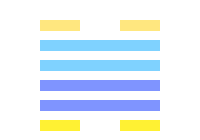
28.1.2.3 (28 > 17) - THE TÂ KWO HEXAGRAM.
- 1. The first line, divided, shows one placing mats of the white mâo grass under things set on the ground. There will be no error.
- 2. The second line, undivided, shows a decayed willow producing shoots, or an old husband in possession of his young wife. There will be advantage in every way.
- 3. The third line, undivided, shows a beam that is weak. There will be evil.
28.1.2.3 (28 > 17) - Trying one's luck
One takes a calculated risk to show others what one can do.
Bing DeepL Google Yandex28.1.2.3 (28 > 17) - Trying one's luck
One takes a calculated risk to show others what one can do.
Bing DeepL Google Yandex28.1.2.3 (28 > 17) - Tá kvoh, le grand excès
Tá kvoh : 1. Grand excès, défaut, manquement ; 2. Traverser, dépasser.
-
1. Ceci est susceptible de deux explications : a. « S’appuyer sur des joncs » est un grand défaut ; ils plient et ne soutiennent pas. b. Pour placer un objet comme natte à offrande, se servir de mao blanc est fautif.
Note. Au lieu de gratter simplement la terre et l’aplanir.
(Le mao blanc représente la pureté, la droiture, kiet tche. Ceci d’après le commentaire représente un excès de précaution. Kwéh hu weï shin (1er sens). - 2.
- 3. Une poutre, un pilier trop faible (voir texte I) sont mauvais (ils ne peuvent supporter) (grand défaut).
28.1.2.3 (28 > 17) - Tenter sa chance
On prend un risque calculé pour montrer aux autres ce que l'on sait faire.
Bing DeepL Google Yandex28.1.2.3 (28 > 17) - Lemondás
- 1. Fejlődni akar a gyengeség miatt.
- 2. Ha valaki nehézségekbe ütközik, emelje fel a leggyengébbet is hogy megőrizhesse jövőjét.
- 3. Ápolja kapcsolatait.
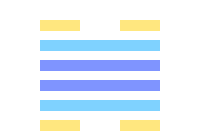
28.3.4 (28 > 29) - THE TÂ KWO HEXAGRAM.
- 3. The third line, undivided, shows a beam that is weak. There will be evil.
- 4. The fourth line, undivided, shows a beam curving upwards. There will be good fortune. If (the subject of it) looks for other (help but that of line one), there will be cause for regret.
28.3.4 (28 > 29) - Contradicting those who are sincere
One commits irreparable mistakes in attempting to overtake others.
Bing DeepL Google Yandex28.3.4 (28 > 29) - Contradicting those who are sincere
One commits irreparable mistakes in attempting to overtake others.
Bing DeepL Google Yandex28.3.4 (28 > 29) - Tá kvoh, le grand excès
Tá kvoh : 1. Grand excès, défaut, manquement ; 2. Traverser, dépasser.
- 3. Une poutre, un pilier trop faible (voir texte I) sont mauvais (ils ne peuvent supporter) (grand défaut).
- 4. Une colonne haute et forte est bonne ; toute autre est dangereuse (opposition à ce qui précède)
28.3.4 (28 > 29) - Contredire ceux qui sont sincères
On commet des erreurs irréparables en tentant de prendre l'ascendant sur les autres.
Bing DeepL Google Yandex28.3.4 (28 > 29) - Lemondás
- 3. Ápolja kapcsolatait.
- 4. Mások támogatják de még fel kell épülnie.
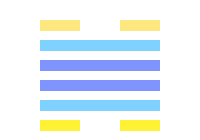
28.1.3.4 (28 > 60) - THE TÂ KWO HEXAGRAM.
- 1. The first line, divided, shows one placing mats of the white mâo grass under things set on the ground. There will be no error.
- 3. The third line, undivided, shows a beam that is weak. There will be evil.
- 4. The fourth line, undivided, shows a beam curving upwards. There will be good fortune. If (the subject of it) looks for other (help but that of line one), there will be cause for regret.
28.1.3.4 (28 > 60) - Being uncompromising
One stops lecturing to take action.
Bing DeepL Google Yandex28.1.3.4 (28 > 60) - Being uncompromising
One stops lecturing to take action.
Bing DeepL Google Yandex28.1.3.4 (28 > 60) - Tá kvoh, le grand excès
Tá kvoh : 1. Grand excès, défaut, manquement ; 2. Traverser, dépasser.
-
1. Ceci est susceptible de deux explications : a. « S’appuyer sur des joncs » est un grand défaut ; ils plient et ne soutiennent pas. b. Pour placer un objet comme natte à offrande, se servir de mao blanc est fautif.
Note. Au lieu de gratter simplement la terre et l’aplanir.
(Le mao blanc représente la pureté, la droiture, kiet tche. Ceci d’après le commentaire représente un excès de précaution. Kwéh hu weï shin (1er sens). - 3. Une poutre, un pilier trop faible (voir texte I) sont mauvais (ils ne peuvent supporter) (grand défaut).
- 4. Une colonne haute et forte est bonne ; toute autre est dangereuse (opposition à ce qui précède)
28.1.3.4 (28 > 60) - Être inflexible
On arrête de faire de la morale pour passer à l'action.
Bing DeepL Google Yandex28.1.3.4 (28 > 60) - Lemondás
- 1. Fejlődni akar a gyengeség miatt.
- 3. Ápolja kapcsolatait.
- 4. Mások támogatják de még fel kell épülnie.
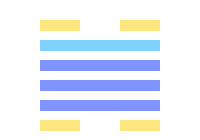
28.2.3.4 (28 > 8) - THE TÂ KWO HEXAGRAM.
- 2. The second line, undivided, shows a decayed willow producing shoots, or an old husband in possession of his young wife. There will be advantage in every way.
- 3. The third line, undivided, shows a beam that is weak. There will be evil.
- 4. The fourth line, undivided, shows a beam curving upwards. There will be good fortune. If (the subject of it) looks for other (help but that of line one), there will be cause for regret.
28.2.3.4 (28 > 8) - Being straightforward
One gives up the superfluous to go straight to the point.
Bing DeepL Google Yandex28.2.3.4 (28 > 8) - Being straightforward
One gives up the superfluous to go straight to the point.
Bing DeepL Google Yandex28.2.3.4 (28 > 8) - Tá kvoh, le grand excès
Tá kvoh : 1. Grand excès, défaut, manquement ; 2. Traverser, dépasser.
- 2.
- 3. Une poutre, un pilier trop faible (voir texte I) sont mauvais (ils ne peuvent supporter) (grand défaut).
- 4. Une colonne haute et forte est bonne ; toute autre est dangereuse (opposition à ce qui précède)
28.2.3.4 (28 > 8) - Être direct
On se passe du superflu pour aller droit au but.
Bing DeepL Google Yandex28.2.3.4 (28 > 8) - Lemondás
- 2. Ha valaki nehézségekbe ütközik, emelje fel a leggyengébbet is hogy megőrizhesse jövőjét.
- 3. Ápolja kapcsolatait.
- 4. Mások támogatják de még fel kell épülnie.
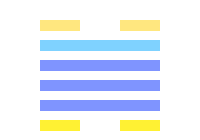
28.1.2.3.4 (28 > 3) - THE TÂ KWO HEXAGRAM.
- 1. The first line, divided, shows one placing mats of the white mâo grass under things set on the ground. There will be no error.
- 2. The second line, undivided, shows a decayed willow producing shoots, or an old husband in possession of his young wife. There will be advantage in every way.
- 3. The third line, undivided, shows a beam that is weak. There will be evil.
- 4. The fourth line, undivided, shows a beam curving upwards. There will be good fortune. If (the subject of it) looks for other (help but that of line one), there will be cause for regret.
28.1.2.3.4 (28 > 3) - Keeping one's secrets
Others may ask for proofs without the need to satisfy them.
Bing DeepL Google Yandex28.1.2.3.4 (28 > 3) - Keeping one's secrets
Others may ask for proofs without the need to satisfy them.
Bing DeepL Google Yandex28.1.2.3.4 (28 > 3) - Tá kvoh, le grand excès
Tá kvoh : 1. Grand excès, défaut, manquement ; 2. Traverser, dépasser.
-
1. Ceci est susceptible de deux explications : a. « S’appuyer sur des joncs » est un grand défaut ; ils plient et ne soutiennent pas. b. Pour placer un objet comme natte à offrande, se servir de mao blanc est fautif.
Note. Au lieu de gratter simplement la terre et l’aplanir.
(Le mao blanc représente la pureté, la droiture, kiet tche. Ceci d’après le commentaire représente un excès de précaution. Kwéh hu weï shin (1er sens). - 2.
- 3. Une poutre, un pilier trop faible (voir texte I) sont mauvais (ils ne peuvent supporter) (grand défaut).
- 4. Une colonne haute et forte est bonne ; toute autre est dangereuse (opposition à ce qui précède)
28.1.2.3.4 (28 > 3) - Garder ses secrets
Les autres peuvent réclamer des preuves sans qu'on ait besoin de les satisfaire.
Bing DeepL Google Yandex28.1.2.3.4 (28 > 3) - Lemondás
- 1. Fejlődni akar a gyengeség miatt.
- 2. Ha valaki nehézségekbe ütközik, emelje fel a leggyengébbet is hogy megőrizhesse jövőjét.
- 3. Ápolja kapcsolatait.
- 4. Mások támogatják de még fel kell épülnie.
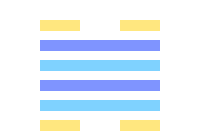
28.3.5 (28 > 40) - THE TÂ KWO HEXAGRAM.
- 3. The third line, undivided, shows a beam that is weak. There will be evil.
- 5. The fifth line, undivided, shows a decayed willow producing flowers, or an old wife in possession of her young husband. There will be occasion neither for blame nor for praise.
28.3.5 (28 > 40) - Making a flop
One becomes the target of mockery when others learn that one has been disappointing.
Bing DeepL Google Yandex28.3.5 (28 > 40) - Making a flop
One becomes the target of mockery when others learn that one has been disappointing.
Bing DeepL Google Yandex28.3.5 (28 > 40) - Tá kvoh, le grand excès
Tá kvoh : 1. Grand excès, défaut, manquement ; 2. Traverser, dépasser.
- 3. Une poutre, un pilier trop faible (voir texte I) sont mauvais (ils ne peuvent supporter) (grand défaut).
- 5. Un vieux saule produisant une fleur, une vieille femme épousant un homme encore jeune, quoique non blâmables, ne peuvent être loués. La fleur du vieux saule ne peut durer, l’époux d’une vieille femme peut s’en dégoûter. (Faits qui passent les règles ordinaires.)
28.3.5 (28 > 40) - Faire un flop
On devient la cible de moqueries quand les autres apprennent qu'on a été décevant.
Bing DeepL Google Yandex28.3.5 (28 > 40) - Lemondás
- 3. Ápolja kapcsolatait.
- 5. Igyekszik javítani mielőtt mások észrevennék a hanyatlást.
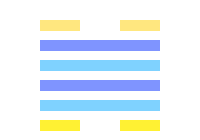
28.1.3.5 (28 > 54) - THE TÂ KWO HEXAGRAM.
- 1. The first line, divided, shows one placing mats of the white mâo grass under things set on the ground. There will be no error.
- 3. The third line, undivided, shows a beam that is weak. There will be evil.
- 5. The fifth line, undivided, shows a decayed willow producing flowers, or an old wife in possession of her young husband. There will be occasion neither for blame nor for praise.
28.1.3.5 (28 > 54) - Losing control
When one is frivolous one does not care about the future of one's children.
Bing DeepL Google Yandex28.1.3.5 (28 > 54) - Losing control
When one is frivolous one does not care about the future of one's children.
Bing DeepL Google Yandex28.1.3.5 (28 > 54) - Tá kvoh, le grand excès
Tá kvoh : 1. Grand excès, défaut, manquement ; 2. Traverser, dépasser.
-
1. Ceci est susceptible de deux explications : a. « S’appuyer sur des joncs » est un grand défaut ; ils plient et ne soutiennent pas. b. Pour placer un objet comme natte à offrande, se servir de mao blanc est fautif.
Note. Au lieu de gratter simplement la terre et l’aplanir.
(Le mao blanc représente la pureté, la droiture, kiet tche. Ceci d’après le commentaire représente un excès de précaution. Kwéh hu weï shin (1er sens). - 3. Une poutre, un pilier trop faible (voir texte I) sont mauvais (ils ne peuvent supporter) (grand défaut).
- 5. Un vieux saule produisant une fleur, une vieille femme épousant un homme encore jeune, quoique non blâmables, ne peuvent être loués. La fleur du vieux saule ne peut durer, l’époux d’une vieille femme peut s’en dégoûter. (Faits qui passent les règles ordinaires.)
28.1.3.5 (28 > 54) - Perdre le contrôle
Quand on est frivole on ne se soucie pas de l'avenir de ses enfants.
Bing DeepL Google Yandex28.1.3.5 (28 > 54) - Lemondás
- 1. Fejlődni akar a gyengeség miatt.
- 3. Ápolja kapcsolatait.
- 5. Igyekszik javítani mielőtt mások észrevennék a hanyatlást.
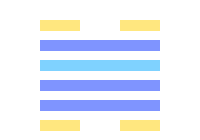
28.2.3.5 (28 > 16) - THE TÂ KWO HEXAGRAM.
- 2. The second line, undivided, shows a decayed willow producing shoots, or an old husband in possession of his young wife. There will be advantage in every way.
- 3. The third line, undivided, shows a beam that is weak. There will be evil.
- 5. The fifth line, undivided, shows a decayed willow producing flowers, or an old wife in possession of her young husband. There will be occasion neither for blame nor for praise.
28.2.3.5 (28 > 16) - Continuing one's training as an assistant.
One hurries to prepare oneself to learn to respond without hesitation.
Bing DeepL Google Yandex28.2.3.5 (28 > 16) - Continuing one's training as an assistant.
One hurries to prepare oneself to learn to respond without hesitation.
Bing DeepL Google Yandex28.2.3.5 (28 > 16) - Tá kvoh, le grand excès
Tá kvoh : 1. Grand excès, défaut, manquement ; 2. Traverser, dépasser.
- 2.
- 3. Une poutre, un pilier trop faible (voir texte I) sont mauvais (ils ne peuvent supporter) (grand défaut).
- 5. Un vieux saule produisant une fleur, une vieille femme épousant un homme encore jeune, quoique non blâmables, ne peuvent être loués. La fleur du vieux saule ne peut durer, l’époux d’une vieille femme peut s’en dégoûter. (Faits qui passent les règles ordinaires.)
28.2.3.5 (28 > 16) - Continuer sa formation d’assistant.
On se dépêche de se préparer pour apprendre à répondre sans hésiter.
Bing DeepL Google Yandex28.2.3.5 (28 > 16) - Lemondás
- 2. Ha valaki nehézségekbe ütközik, emelje fel a leggyengébbet is hogy megőrizhesse jövőjét.
- 3. Ápolja kapcsolatait.
- 5. Igyekszik javítani mielőtt mások észrevennék a hanyatlást.
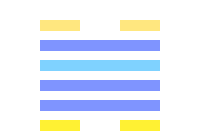
28.1.2.3.5 (28 > 51) - THE TÂ KWO HEXAGRAM.
- 1. The first line, divided, shows one placing mats of the white mâo grass under things set on the ground. There will be no error.
- 2. The second line, undivided, shows a decayed willow producing shoots, or an old husband in possession of his young wife. There will be advantage in every way.
- 3. The third line, undivided, shows a beam that is weak. There will be evil.
- 5. The fifth line, undivided, shows a decayed willow producing flowers, or an old wife in possession of her young husband. There will be occasion neither for blame nor for praise.
28.1.2.3.5 (28 > 51) - Reimbursing down to the last cent
One returns to those who have been dispossessed all the property one has taken from them.
Bing DeepL Google Yandex28.1.2.3.5 (28 > 51) - Reimbursing down to the last cent
One returns to those who have been dispossessed all the property one has taken from them.
Bing DeepL Google Yandex28.1.2.3.5 (28 > 51) - Tá kvoh, le grand excès
Tá kvoh : 1. Grand excès, défaut, manquement ; 2. Traverser, dépasser.
-
1. Ceci est susceptible de deux explications : a. « S’appuyer sur des joncs » est un grand défaut ; ils plient et ne soutiennent pas. b. Pour placer un objet comme natte à offrande, se servir de mao blanc est fautif.
Note. Au lieu de gratter simplement la terre et l’aplanir.
(Le mao blanc représente la pureté, la droiture, kiet tche. Ceci d’après le commentaire représente un excès de précaution. Kwéh hu weï shin (1er sens). - 2.
- 3. Une poutre, un pilier trop faible (voir texte I) sont mauvais (ils ne peuvent supporter) (grand défaut).
- 5. Un vieux saule produisant une fleur, une vieille femme épousant un homme encore jeune, quoique non blâmables, ne peuvent être loués. La fleur du vieux saule ne peut durer, l’époux d’une vieille femme peut s’en dégoûter. (Faits qui passent les règles ordinaires.)
28.1.2.3.5 (28 > 51) - Rembourser jusqu'au dernier centime
On restitue à ceux qui ont été spoliés l'ensemble des biens qu'on leur a pris.
Bing DeepL Google Yandex28.1.2.3.5 (28 > 51) - Lemondás
- 1. Fejlődni akar a gyengeség miatt.
- 2. Ha valaki nehézségekbe ütközik, emelje fel a leggyengébbet is hogy megőrizhesse jövőjét.
- 3. Ápolja kapcsolatait.
- 5. Igyekszik javítani mielőtt mások észrevennék a hanyatlást.
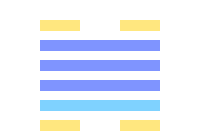
28.3.4.5 (28 > 7) - THE TÂ KWO HEXAGRAM.
- 3. The third line, undivided, shows a beam that is weak. There will be evil.
- 4. The fourth line, undivided, shows a beam curving upwards. There will be good fortune. If (the subject of it) looks for other (help but that of line one), there will be cause for regret.
- 5. The fifth line, undivided, shows a decayed willow producing flowers, or an old wife in possession of her young husband. There will be occasion neither for blame nor for praise.
28.3.4.5 (28 > 7) - Making the journey alone
One wants to produce works without anyone's support.
Bing DeepL Google Yandex28.3.4.5 (28 > 7) - Making the journey alone
One wants to produce works without anyone's support.
Bing DeepL Google Yandex28.3.4.5 (28 > 7) - Tá kvoh, le grand excès
Tá kvoh : 1. Grand excès, défaut, manquement ; 2. Traverser, dépasser.
- 3. Une poutre, un pilier trop faible (voir texte I) sont mauvais (ils ne peuvent supporter) (grand défaut).
- 4. Une colonne haute et forte est bonne ; toute autre est dangereuse (opposition à ce qui précède)
- 5. Un vieux saule produisant une fleur, une vieille femme épousant un homme encore jeune, quoique non blâmables, ne peuvent être loués. La fleur du vieux saule ne peut durer, l’époux d’une vieille femme peut s’en dégoûter. (Faits qui passent les règles ordinaires.)
28.3.4.5 (28 > 7) - Faire la traversée en solitaire
On a envie de réaliser des œuvres sans le soutien de quiconque.
Bing DeepL Google Yandex28.3.4.5 (28 > 7) - Lemondás
- 3. Ápolja kapcsolatait.
- 4. Mások támogatják de még fel kell épülnie.
- 5. Igyekszik javítani mielőtt mások észrevennék a hanyatlást.
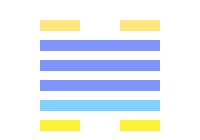
28.1.3.4.5 (28 > 19) - THE TÂ KWO HEXAGRAM.
- 1. The first line, divided, shows one placing mats of the white mâo grass under things set on the ground. There will be no error.
- 3. The third line, undivided, shows a beam that is weak. There will be evil.
- 4. The fourth line, undivided, shows a beam curving upwards. There will be good fortune. If (the subject of it) looks for other (help but that of line one), there will be cause for regret.
- 5. The fifth line, undivided, shows a decayed willow producing flowers, or an old wife in possession of her young husband. There will be occasion neither for blame nor for praise.
28.1.3.4.5 (28 > 19) - Adapting to one's needs
One recalibrates an instrument designed for other uses.
Bing DeepL Google Yandex28.1.3.4.5 (28 > 19) - Adapting to one's needs
One recalibrates an instrument designed for other uses.
Bing DeepL Google Yandex28.1.3.4.5 (28 > 19) - Tá kvoh, le grand excès
Tá kvoh : 1. Grand excès, défaut, manquement ; 2. Traverser, dépasser.
-
1. Ceci est susceptible de deux explications : a. « S’appuyer sur des joncs » est un grand défaut ; ils plient et ne soutiennent pas. b. Pour placer un objet comme natte à offrande, se servir de mao blanc est fautif.
Note. Au lieu de gratter simplement la terre et l’aplanir.
(Le mao blanc représente la pureté, la droiture, kiet tche. Ceci d’après le commentaire représente un excès de précaution. Kwéh hu weï shin (1er sens). - 3. Une poutre, un pilier trop faible (voir texte I) sont mauvais (ils ne peuvent supporter) (grand défaut).
- 4. Une colonne haute et forte est bonne ; toute autre est dangereuse (opposition à ce qui précède)
- 5. Un vieux saule produisant une fleur, une vieille femme épousant un homme encore jeune, quoique non blâmables, ne peuvent être loués. La fleur du vieux saule ne peut durer, l’époux d’une vieille femme peut s’en dégoûter. (Faits qui passent les règles ordinaires.)
28.1.3.4.5 (28 > 19) - Adapter à ses besoins
On recalibre un instrument conçu pour d'autres emplois.
Bing DeepL Google Yandex28.1.3.4.5 (28 > 19) - Lemondás
- 1. Fejlődni akar a gyengeség miatt.
- 3. Ápolja kapcsolatait.
- 4. Mások támogatják de még fel kell épülnie.
- 5. Igyekszik javítani mielőtt mások észrevennék a hanyatlást.
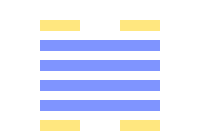
28.2.3.4.5 (28 > 2) - THE TÂ KWO HEXAGRAM.
- 2. The second line, undivided, shows a decayed willow producing shoots, or an old husband in possession of his young wife. There will be advantage in every way.
- 3. The third line, undivided, shows a beam that is weak. There will be evil.
- 4. The fourth line, undivided, shows a beam curving upwards. There will be good fortune. If (the subject of it) looks for other (help but that of line one), there will be cause for regret.
- 5. The fifth line, undivided, shows a decayed willow producing flowers, or an old wife in possession of her young husband. There will be occasion neither for blame nor for praise.
28.2.3.4.5 (28 > 2) - Going all out
One is going to do the best one can so that others are impressed.
Bing DeepL Google Yandex28.2.3.4.5 (28 > 2) - Going all out
One is going to do the best one can so that others are impressed.
Bing DeepL Google Yandex28.2.3.4.5 (28 > 2) - Tá kvoh, le grand excès
Tá kvoh : 1. Grand excès, défaut, manquement ; 2. Traverser, dépasser.
- 2.
- 3. Une poutre, un pilier trop faible (voir texte I) sont mauvais (ils ne peuvent supporter) (grand défaut).
- 4. Une colonne haute et forte est bonne ; toute autre est dangereuse (opposition à ce qui précède)
- 5. Un vieux saule produisant une fleur, une vieille femme épousant un homme encore jeune, quoique non blâmables, ne peuvent être loués. La fleur du vieux saule ne peut durer, l’époux d’une vieille femme peut s’en dégoûter. (Faits qui passent les règles ordinaires.)
28.2.3.4.5 (28 > 2) - Sortir le grand jeu
On va faire du mieux qu’on peut pour que les autres soient impressionnés.
Bing DeepL Google Yandex28.2.3.4.5 (28 > 2) - Lemondás
- 2. Ha valaki nehézségekbe ütközik, emelje fel a leggyengébbet is hogy megőrizhesse jövőjét.
- 3. Ápolja kapcsolatait.
- 4. Mások támogatják de még fel kell épülnie.
- 5. Igyekszik javítani mielőtt mások észrevennék a hanyatlást.
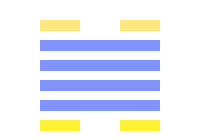
28.1.2.3.4.5 (28 > 24) - THE TÂ KWO HEXAGRAM.
- 1. The first line, divided, shows one placing mats of the white mâo grass under things set on the ground. There will be no error.
- 2. The second line, undivided, shows a decayed willow producing shoots, or an old husband in possession of his young wife. There will be advantage in every way.
- 3. The third line, undivided, shows a beam that is weak. There will be evil.
- 4. The fourth line, undivided, shows a beam curving upwards. There will be good fortune. If (the subject of it) looks for other (help but that of line one), there will be cause for regret.
- 5. The fifth line, undivided, shows a decayed willow producing flowers, or an old wife in possession of her young husband. There will be occasion neither for blame nor for praise.
28.1.2.3.4.5 (28 > 24) - Speaking without taboos
One is referring to practices that have become illegal.
Bing DeepL Google Yandex28.1.2.3.4.5 (28 > 24) - Speaking without taboos
One is referring to practices that have become illegal.
Bing DeepL Google Yandex28.1.2.3.4.5 (28 > 24) - Tá kvoh, le grand excès
Tá kvoh : 1. Grand excès, défaut, manquement ; 2. Traverser, dépasser.
-
1. Ceci est susceptible de deux explications : a. « S’appuyer sur des joncs » est un grand défaut ; ils plient et ne soutiennent pas. b. Pour placer un objet comme natte à offrande, se servir de mao blanc est fautif.
Note. Au lieu de gratter simplement la terre et l’aplanir.
(Le mao blanc représente la pureté, la droiture, kiet tche. Ceci d’après le commentaire représente un excès de précaution. Kwéh hu weï shin (1er sens). - 2.
- 3. Une poutre, un pilier trop faible (voir texte I) sont mauvais (ils ne peuvent supporter) (grand défaut).
- 4. Une colonne haute et forte est bonne ; toute autre est dangereuse (opposition à ce qui précède)
- 5. Un vieux saule produisant une fleur, une vieille femme épousant un homme encore jeune, quoique non blâmables, ne peuvent être loués. La fleur du vieux saule ne peut durer, l’époux d’une vieille femme peut s’en dégoûter. (Faits qui passent les règles ordinaires.)
28.1.2.3.4.5 (28 > 24) - Parler sans tabous
On se réfère à des pratiques devenues illicites.
Bing DeepL Google Yandex28.1.2.3.4.5 (28 > 24) - Lemondás
- 1. Fejlődni akar a gyengeség miatt.
- 2. Ha valaki nehézségekbe ütközik, emelje fel a leggyengébbet is hogy megőrizhesse jövőjét.
- 3. Ápolja kapcsolatait.
- 4. Mások támogatják de még fel kell épülnie.
- 5. Igyekszik javítani mielőtt mások észrevennék a hanyatlást.
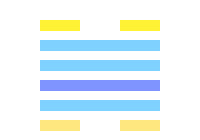
28.3.6 (28 > 6) - THE TÂ KWO HEXAGRAM.
- 3. The third line, undivided, shows a beam that is weak. There will be evil.
- 6. The topmost line, divided, shows its subject with extraordinary (boldness) wading through a stream, till the water hides the crown of his head. There will be evil, but no ground for blame.
28.3.6 (28 > 6) - Asking forgiveness
One faces one's responsibilities to go see those one has wronged.
Bing DeepL Google Yandex28.3.6 (28 > 6) - Asking forgiveness
One faces one's responsibilities to go see those one has wronged.
Bing DeepL Google Yandex28.3.6 (28 > 6) - Tá kvoh, le grand excès
Tá kvoh : 1. Grand excès, défaut, manquement ; 2. Traverser, dépasser.
- 3. Une poutre, un pilier trop faible (voir texte I) sont mauvais (ils ne peuvent supporter) (grand défaut).
- 6. Traversant un fleuve, y entrer jusqu’au sommet de la tête est chose dangereuse, (mais peut n’être point blâmable, si on le fait pour aider quelqu’un, d’après le Com.) (3e sens). Force défaillante.
28.3.6 (28 > 6) - Demander pardon
On fait face à ses responsabilités pour aller voir ceux à qui l'on a fait du tort.
Bing DeepL Google Yandex28.3.6 (28 > 6) - Lemondás
- 3. Ápolja kapcsolatait.
- 6. Egyedül akar haladni a környezők gyengesége miatt.
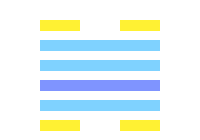
28.1.3.6 (28 > 10) - THE TÂ KWO HEXAGRAM.
- 1. The first line, divided, shows one placing mats of the white mâo grass under things set on the ground. There will be no error.
- 3. The third line, undivided, shows a beam that is weak. There will be evil.
- 6. The topmost line, divided, shows its subject with extraordinary (boldness) wading through a stream, till the water hides the crown of his head. There will be evil, but no ground for blame.
28.1.3.6 (28 > 10) - Rejecting inconsistent measurements
One leaves one's assistants to resume studying.
Bing DeepL Google Yandex28.1.3.6 (28 > 10) - Rejecting inconsistent measurements
One leaves one's assistants to resume studying.
Bing DeepL Google Yandex28.1.3.6 (28 > 10) - Tá kvoh, le grand excès
Tá kvoh : 1. Grand excès, défaut, manquement ; 2. Traverser, dépasser.
-
1. Ceci est susceptible de deux explications : a. « S’appuyer sur des joncs » est un grand défaut ; ils plient et ne soutiennent pas. b. Pour placer un objet comme natte à offrande, se servir de mao blanc est fautif.
Note. Au lieu de gratter simplement la terre et l’aplanir.
(Le mao blanc représente la pureté, la droiture, kiet tche. Ceci d’après le commentaire représente un excès de précaution. Kwéh hu weï shin (1er sens). - 3. Une poutre, un pilier trop faible (voir texte I) sont mauvais (ils ne peuvent supporter) (grand défaut).
- 6. Traversant un fleuve, y entrer jusqu’au sommet de la tête est chose dangereuse, (mais peut n’être point blâmable, si on le fait pour aider quelqu’un, d’après le Com.) (3e sens). Force défaillante.
28.1.3.6 (28 > 10) - Rejeter des mesures incohérentes
On quitte ses assistants pour reprendre ses études.
Bing DeepL Google Yandex28.1.3.6 (28 > 10) - Lemondás
- 1. Fejlődni akar a gyengeség miatt.
- 3. Ápolja kapcsolatait.
- 6. Egyedül akar haladni a környezők gyengesége miatt.
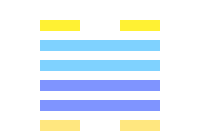
28.2.3.6 (28 > 12) - THE TÂ KWO HEXAGRAM.
- 2. The second line, undivided, shows a decayed willow producing shoots, or an old husband in possession of his young wife. There will be advantage in every way.
- 3. The third line, undivided, shows a beam that is weak. There will be evil.
- 6. The topmost line, divided, shows its subject with extraordinary (boldness) wading through a stream, till the water hides the crown of his head. There will be evil, but no ground for blame.
28.2.3.6 (28 > 12) - Eliminating mediators
One pays the price of an unfinished attempt.
Bing DeepL Google Yandex28.2.3.6 (28 > 12) - Eliminating mediators
One pays the price of an unfinished attempt.
Bing DeepL Google Yandex28.2.3.6 (28 > 12) - Tá kvoh, le grand excès
Tá kvoh : 1. Grand excès, défaut, manquement ; 2. Traverser, dépasser.
- 2.
- 3. Une poutre, un pilier trop faible (voir texte I) sont mauvais (ils ne peuvent supporter) (grand défaut).
- 6. Traversant un fleuve, y entrer jusqu’au sommet de la tête est chose dangereuse, (mais peut n’être point blâmable, si on le fait pour aider quelqu’un, d’après le Com.) (3e sens). Force défaillante.
28.2.3.6 (28 > 12) - Éliminer les médiateurs
On essuie les plâtres d'une tentative inachevée.
Bing DeepL Google Yandex28.2.3.6 (28 > 12) - Lemondás
- 2. Ha valaki nehézségekbe ütközik, emelje fel a leggyengébbet is hogy megőrizhesse jövőjét.
- 3. Ápolja kapcsolatait.
- 6. Egyedül akar haladni a környezők gyengesége miatt.
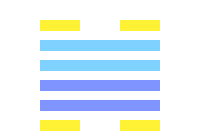
28.1.2.3.6 (28 > 25) - THE TÂ KWO HEXAGRAM.
- 1. The first line, divided, shows one placing mats of the white mâo grass under things set on the ground. There will be no error.
- 2. The second line, undivided, shows a decayed willow producing shoots, or an old husband in possession of his young wife. There will be advantage in every way.
- 3. The third line, undivided, shows a beam that is weak. There will be evil.
- 6. The topmost line, divided, shows its subject with extraordinary (boldness) wading through a stream, till the water hides the crown of his head. There will be evil, but no ground for blame.
28.1.2.3.6 (28 > 25) - Establishing a regulation
One participates with other competitors in the development of fair and equitable rules.
Bing DeepL Google Yandex28.1.2.3.6 (28 > 25) - Establishing a regulation
One participates with other competitors in the development of fair and equitable rules.
Bing DeepL Google Yandex28.1.2.3.6 (28 > 25) - Tá kvoh, le grand excès
Tá kvoh : 1. Grand excès, défaut, manquement ; 2. Traverser, dépasser.
-
1. Ceci est susceptible de deux explications : a. « S’appuyer sur des joncs » est un grand défaut ; ils plient et ne soutiennent pas. b. Pour placer un objet comme natte à offrande, se servir de mao blanc est fautif.
Note. Au lieu de gratter simplement la terre et l’aplanir.
(Le mao blanc représente la pureté, la droiture, kiet tche. Ceci d’après le commentaire représente un excès de précaution. Kwéh hu weï shin (1er sens). - 2.
- 3. Une poutre, un pilier trop faible (voir texte I) sont mauvais (ils ne peuvent supporter) (grand défaut).
- 6. Traversant un fleuve, y entrer jusqu’au sommet de la tête est chose dangereuse, (mais peut n’être point blâmable, si on le fait pour aider quelqu’un, d’après le Com.) (3e sens). Force défaillante.
28.1.2.3.6 (28 > 25) - Établir un règlement
On participe avec les autres concurrents à l'élaboration de règles justes et équitables.
Bing DeepL Google Yandex28.1.2.3.6 (28 > 25) - Lemondás
- 1. Fejlődni akar a gyengeség miatt.
- 2. Ha valaki nehézségekbe ütközik, emelje fel a leggyengébbet is hogy megőrizhesse jövőjét.
- 3. Ápolja kapcsolatait.
- 6. Egyedül akar haladni a környezők gyengesége miatt.
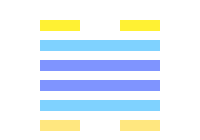
28.3.4.6 (28 > 59) - THE TÂ KWO HEXAGRAM.
- 3. The third line, undivided, shows a beam that is weak. There will be evil.
- 4. The fourth line, undivided, shows a beam curving upwards. There will be good fortune. If (the subject of it) looks for other (help but that of line one), there will be cause for regret.
- 6. The topmost line, divided, shows its subject with extraordinary (boldness) wading through a stream, till the water hides the crown of his head. There will be evil, but no ground for blame.
28.3.4.6 (28 > 59) - Burning bridges
One repaints one's home in red so that others will avoid it.
Bing DeepL Google Yandex28.3.4.6 (28 > 59) - Burning bridges
One repaints one's home in red so that others will avoid it.
Bing DeepL Google Yandex28.3.4.6 (28 > 59) - Tá kvoh, le grand excès
Tá kvoh : 1. Grand excès, défaut, manquement ; 2. Traverser, dépasser.
- 3. Une poutre, un pilier trop faible (voir texte I) sont mauvais (ils ne peuvent supporter) (grand défaut).
- 4. Une colonne haute et forte est bonne ; toute autre est dangereuse (opposition à ce qui précède)
- 6. Traversant un fleuve, y entrer jusqu’au sommet de la tête est chose dangereuse, (mais peut n’être point blâmable, si on le fait pour aider quelqu’un, d’après le Com.) (3e sens). Force défaillante.
28.3.4.6 (28 > 59) - Brûler les ponts
On repeint son habitation en rouge pour que les autres l'évitent.
Bing DeepL Google Yandex28.3.4.6 (28 > 59) - Lemondás
- 3. Ápolja kapcsolatait.
- 4. Mások támogatják de még fel kell épülnie.
- 6. Egyedül akar haladni a környezők gyengesége miatt.
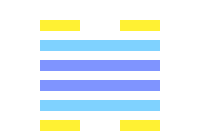
28.1.3.4.6 (28 > 61) - THE TÂ KWO HEXAGRAM.
- 1. The first line, divided, shows one placing mats of the white mâo grass under things set on the ground. There will be no error.
- 3. The third line, undivided, shows a beam that is weak. There will be evil.
- 4. The fourth line, undivided, shows a beam curving upwards. There will be good fortune. If (the subject of it) looks for other (help but that of line one), there will be cause for regret.
- 6. The topmost line, divided, shows its subject with extraordinary (boldness) wading through a stream, till the water hides the crown of his head. There will be evil, but no ground for blame.
28.1.3.4.6 (28 > 61) - Going against the flow
One wants to make progress but is prevented by headwinds.
Bing DeepL Google Yandex28.1.3.4.6 (28 > 61) - Going against the flow
One wants to make progress but is prevented by headwinds.
Bing DeepL Google Yandex28.1.3.4.6 (28 > 61) - Tá kvoh, le grand excès
Tá kvoh : 1. Grand excès, défaut, manquement ; 2. Traverser, dépasser.
-
1. Ceci est susceptible de deux explications : a. « S’appuyer sur des joncs » est un grand défaut ; ils plient et ne soutiennent pas. b. Pour placer un objet comme natte à offrande, se servir de mao blanc est fautif.
Note. Au lieu de gratter simplement la terre et l’aplanir.
(Le mao blanc représente la pureté, la droiture, kiet tche. Ceci d’après le commentaire représente un excès de précaution. Kwéh hu weï shin (1er sens). - 3. Une poutre, un pilier trop faible (voir texte I) sont mauvais (ils ne peuvent supporter) (grand défaut).
- 4. Une colonne haute et forte est bonne ; toute autre est dangereuse (opposition à ce qui précède)
- 6. Traversant un fleuve, y entrer jusqu’au sommet de la tête est chose dangereuse, (mais peut n’être point blâmable, si on le fait pour aider quelqu’un, d’après le Com.) (3e sens). Force défaillante.
28.1.3.4.6 (28 > 61) - Avancer à contre-courant
On veut faire des progrès mais on en est empêché par des vents contraires.
Bing DeepL Google Yandex28.1.3.4.6 (28 > 61) - Lemondás
- 1. Fejlődni akar a gyengeség miatt.
- 3. Ápolja kapcsolatait.
- 4. Mások támogatják de még fel kell épülnie.
- 6. Egyedül akar haladni a környezők gyengesége miatt.
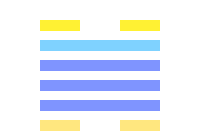
28.2.3.4.6 (28 > 20) - THE TÂ KWO HEXAGRAM.
- 2. The second line, undivided, shows a decayed willow producing shoots, or an old husband in possession of his young wife. There will be advantage in every way.
- 3. The third line, undivided, shows a beam that is weak. There will be evil.
- 4. The fourth line, undivided, shows a beam curving upwards. There will be good fortune. If (the subject of it) looks for other (help but that of line one), there will be cause for regret.
- 6. The topmost line, divided, shows its subject with extraordinary (boldness) wading through a stream, till the water hides the crown of his head. There will be evil, but no ground for blame.
28.2.3.4.6 (28 > 20) - Proving one's worth
One takes the lead over others by showing them one's efficiency.
Bing DeepL Google Yandex28.2.3.4.6 (28 > 20) - Proving one's worth
One takes the lead over others by showing them one's efficiency.
Bing DeepL Google Yandex28.2.3.4.6 (28 > 20) - Tá kvoh, le grand excès
Tá kvoh : 1. Grand excès, défaut, manquement ; 2. Traverser, dépasser.
- 2.
- 3. Une poutre, un pilier trop faible (voir texte I) sont mauvais (ils ne peuvent supporter) (grand défaut).
- 4. Une colonne haute et forte est bonne ; toute autre est dangereuse (opposition à ce qui précède)
- 6. Traversant un fleuve, y entrer jusqu’au sommet de la tête est chose dangereuse, (mais peut n’être point blâmable, si on le fait pour aider quelqu’un, d’après le Com.) (3e sens). Force défaillante.
28.2.3.4.6 (28 > 20) - Faire ses preuves
On prend l'ascendant sur les autres en leur montrant son efficacité.
Bing DeepL Google Yandex28.2.3.4.6 (28 > 20) - Lemondás
- 2. Ha valaki nehézségekbe ütközik, emelje fel a leggyengébbet is hogy megőrizhesse jövőjét.
- 3. Ápolja kapcsolatait.
- 4. Mások támogatják de még fel kell épülnie.
- 6. Egyedül akar haladni a környezők gyengesége miatt.
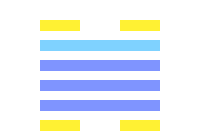
28.1.2.3.4.6 (28 > 42) - THE TÂ KWO HEXAGRAM.
- 1. The first line, divided, shows one placing mats of the white mâo grass under things set on the ground. There will be no error.
- 2. The second line, undivided, shows a decayed willow producing shoots, or an old husband in possession of his young wife. There will be advantage in every way.
- 3. The third line, undivided, shows a beam that is weak. There will be evil.
- 4. The fourth line, undivided, shows a beam curving upwards. There will be good fortune. If (the subject of it) looks for other (help but that of line one), there will be cause for regret.
- 6. The topmost line, divided, shows its subject with extraordinary (boldness) wading through a stream, till the water hides the crown of his head. There will be evil, but no ground for blame.
28.1.2.3.4.6 (28 > 42) - Dissociating
One criticises others to not seem to support them.
Bing DeepL Google Yandex28.1.2.3.4.6 (28 > 42) - Dissociating
One criticizes others to not seem to support them.
Bing DeepL Google Yandex28.1.2.3.4.6 (28 > 42) - Tá kvoh, le grand excès
Tá kvoh : 1. Grand excès, défaut, manquement ; 2. Traverser, dépasser.
-
1. Ceci est susceptible de deux explications : a. « S’appuyer sur des joncs » est un grand défaut ; ils plient et ne soutiennent pas. b. Pour placer un objet comme natte à offrande, se servir de mao blanc est fautif.
Note. Au lieu de gratter simplement la terre et l’aplanir.
(Le mao blanc représente la pureté, la droiture, kiet tche. Ceci d’après le commentaire représente un excès de précaution. Kwéh hu weï shin (1er sens). - 2.
- 3. Une poutre, un pilier trop faible (voir texte I) sont mauvais (ils ne peuvent supporter) (grand défaut).
- 4. Une colonne haute et forte est bonne ; toute autre est dangereuse (opposition à ce qui précède)
- 6. Traversant un fleuve, y entrer jusqu’au sommet de la tête est chose dangereuse, (mais peut n’être point blâmable, si on le fait pour aider quelqu’un, d’après le Com.) (3e sens). Force défaillante.
28.1.2.3.4.6 (28 > 42) - Se désolidariser
On critique les autres pour ne pas avoir l'air de les soutenir.
Bing DeepL Google Yandex28.1.2.3.4.6 (28 > 42) - Lemondás
- 1. Fejlődni akar a gyengeség miatt.
- 2. Ha valaki nehézségekbe ütközik, emelje fel a leggyengébbet is hogy megőrizhesse jövőjét.
- 3. Ápolja kapcsolatait.
- 4. Mások támogatják de még fel kell épülnie.
- 6. Egyedül akar haladni a környezők gyengesége miatt.
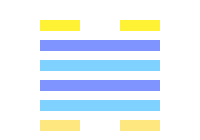
28.3.5.6 (28 > 64) - THE TÂ KWO HEXAGRAM.
- 3. The third line, undivided, shows a beam that is weak. There will be evil.
- 5. The fifth line, undivided, shows a decayed willow producing flowers, or an old wife in possession of her young husband. There will be occasion neither for blame nor for praise.
- 6. The topmost line, divided, shows its subject with extraordinary (boldness) wading through a stream, till the water hides the crown of his head. There will be evil, but no ground for blame.
28.3.5.6 (28 > 64) - Becoming unbearable
One always finds something to criticise when others are not friends.
Bing DeepL Google Yandex28.3.5.6 (28 > 64) - Becoming unbearable
One always finds something to criticize when others are not friends.
Bing DeepL Google Yandex28.3.5.6 (28 > 64) - Tá kvoh, le grand excès
Tá kvoh : 1. Grand excès, défaut, manquement ; 2. Traverser, dépasser.
- 3. Une poutre, un pilier trop faible (voir texte I) sont mauvais (ils ne peuvent supporter) (grand défaut).
- 5. Un vieux saule produisant une fleur, une vieille femme épousant un homme encore jeune, quoique non blâmables, ne peuvent être loués. La fleur du vieux saule ne peut durer, l’époux d’une vieille femme peut s’en dégoûter. (Faits qui passent les règles ordinaires.)
- 6. Traversant un fleuve, y entrer jusqu’au sommet de la tête est chose dangereuse, (mais peut n’être point blâmable, si on le fait pour aider quelqu’un, d’après le Com.) (3e sens). Force défaillante.
28.3.5.6 (28 > 64) - Devenir insupportable
On trouve toujours quelque chose à critiquer quand les autres ne sont pas des amis.
Bing DeepL Google Yandex28.3.5.6 (28 > 64) - Lemondás
- 3. Ápolja kapcsolatait.
- 5. Igyekszik javítani mielőtt mások észrevennék a hanyatlást.
- 6. Egyedül akar haladni a környezők gyengesége miatt.
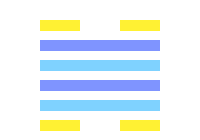
28.1.3.5.6 (28 > 38) - THE TÂ KWO HEXAGRAM.
- 1. The first line, divided, shows one placing mats of the white mâo grass under things set on the ground. There will be no error.
- 3. The third line, undivided, shows a beam that is weak. There will be evil.
- 5. The fifth line, undivided, shows a decayed willow producing flowers, or an old wife in possession of her young husband. There will be occasion neither for blame nor for praise.
- 6. The topmost line, divided, shows its subject with extraordinary (boldness) wading through a stream, till the water hides the crown of his head. There will be evil, but no ground for blame.
28.1.3.5.6 (28 > 38) - Wanting the happiness of one' s family
One wishes to have more power to surround one's relatives with benefits.
Bing DeepL Google Yandex28.1.3.5.6 (28 > 38) - Wanting the happiness of one' s family
One wishes to have more power to surround one's relatives with benefits.
Bing DeepL Google Yandex28.1.3.5.6 (28 > 38) - Tá kvoh, le grand excès
Tá kvoh : 1. Grand excès, défaut, manquement ; 2. Traverser, dépasser.
-
1. Ceci est susceptible de deux explications : a. « S’appuyer sur des joncs » est un grand défaut ; ils plient et ne soutiennent pas. b. Pour placer un objet comme natte à offrande, se servir de mao blanc est fautif.
Note. Au lieu de gratter simplement la terre et l’aplanir.
(Le mao blanc représente la pureté, la droiture, kiet tche. Ceci d’après le commentaire représente un excès de précaution. Kwéh hu weï shin (1er sens). - 3. Une poutre, un pilier trop faible (voir texte I) sont mauvais (ils ne peuvent supporter) (grand défaut).
- 5. Un vieux saule produisant une fleur, une vieille femme épousant un homme encore jeune, quoique non blâmables, ne peuvent être loués. La fleur du vieux saule ne peut durer, l’époux d’une vieille femme peut s’en dégoûter. (Faits qui passent les règles ordinaires.)
- 6. Traversant un fleuve, y entrer jusqu’au sommet de la tête est chose dangereuse, (mais peut n’être point blâmable, si on le fait pour aider quelqu’un, d’après le Com.) (3e sens). Force défaillante.
28.1.3.5.6 (28 > 38) - Vouloir le bonheur des siens
On souhaite avoir davantage de pouvoir pour entourer ses proches de bienfaits.
Bing DeepL Google Yandex28.1.3.5.6 (28 > 38) - Lemondás
- 1. Fejlődni akar a gyengeség miatt.
- 3. Ápolja kapcsolatait.
- 5. Igyekszik javítani mielőtt mások észrevennék a hanyatlást.
- 6. Egyedül akar haladni a környezők gyengesége miatt.
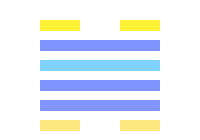
28.2.3.5.6 (28 > 35) - THE TÂ KWO HEXAGRAM.
- 2. The second line, undivided, shows a decayed willow producing shoots, or an old husband in possession of his young wife. There will be advantage in every way.
- 3. The third line, undivided, shows a beam that is weak. There will be evil.
- 5. The fifth line, undivided, shows a decayed willow producing flowers, or an old wife in possession of her young husband. There will be occasion neither for blame nor for praise.
- 6. The topmost line, divided, shows its subject with extraordinary (boldness) wading through a stream, till the water hides the crown of his head. There will be evil, but no ground for blame.
28.2.3.5.6 (28 > 35) - Being blunt
One fiddles confidently with very fragile objects.
Bing DeepL Google Yandex28.2.3.5.6 (28 > 35) - Being blunt
One fiddles confidently with very fragile objects.
Bing DeepL Google Yandex28.2.3.5.6 (28 > 35) - Tá kvoh, le grand excès
Tá kvoh : 1. Grand excès, défaut, manquement ; 2. Traverser, dépasser.
- 2.
- 3. Une poutre, un pilier trop faible (voir texte I) sont mauvais (ils ne peuvent supporter) (grand défaut).
- 5. Un vieux saule produisant une fleur, une vieille femme épousant un homme encore jeune, quoique non blâmables, ne peuvent être loués. La fleur du vieux saule ne peut durer, l’époux d’une vieille femme peut s’en dégoûter. (Faits qui passent les règles ordinaires.)
- 6. Traversant un fleuve, y entrer jusqu’au sommet de la tête est chose dangereuse, (mais peut n’être point blâmable, si on le fait pour aider quelqu’un, d’après le Com.) (3e sens). Force défaillante.
28.2.3.5.6 (28 > 35) - Ne pas prendre de pincettes
On tripote avec assurance des objets très fragiles.
Bing DeepL Google Yandex28.2.3.5.6 (28 > 35) - Lemondás
- 2. Ha valaki nehézségekbe ütközik, emelje fel a leggyengébbet is hogy megőrizhesse jövőjét.
- 3. Ápolja kapcsolatait.
- 5. Igyekszik javítani mielőtt mások észrevennék a hanyatlást.
- 6. Egyedül akar haladni a környezők gyengesége miatt.
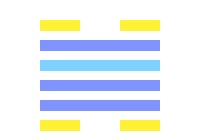
28.1.2.3.5.6 (28 > 21) - THE TÂ KWO HEXAGRAM.
- 1. The first line, divided, shows one placing mats of the white mâo grass under things set on the ground. There will be no error.
- 2. The second line, undivided, shows a decayed willow producing shoots, or an old husband in possession of his young wife. There will be advantage in every way.
- 3. The third line, undivided, shows a beam that is weak. There will be evil.
- 5. The fifth line, undivided, shows a decayed willow producing flowers, or an old wife in possession of her young husband. There will be occasion neither for blame nor for praise.
- 6. The topmost line, divided, shows its subject with extraordinary (boldness) wading through a stream, till the water hides the crown of his head. There will be evil, but no ground for blame.
28.1.2.3.5.6 (28 > 21) - Seeking asylum
One finds refuge among those who have been able to win the most seasoned.
Bing DeepL Google Yandex28.1.2.3.5.6 (28 > 21) - Seeking asylum
One finds refuge among those who have been able to win the most seasoned.
Bing DeepL Google Yandex28.1.2.3.5.6 (28 > 21) - Tá kvoh, le grand excès
Tá kvoh : 1. Grand excès, défaut, manquement ; 2. Traverser, dépasser.
-
1. Ceci est susceptible de deux explications : a. « S’appuyer sur des joncs » est un grand défaut ; ils plient et ne soutiennent pas. b. Pour placer un objet comme natte à offrande, se servir de mao blanc est fautif.
Note. Au lieu de gratter simplement la terre et l’aplanir.
(Le mao blanc représente la pureté, la droiture, kiet tche. Ceci d’après le commentaire représente un excès de précaution. Kwéh hu weï shin (1er sens). - 2.
- 3. Une poutre, un pilier trop faible (voir texte I) sont mauvais (ils ne peuvent supporter) (grand défaut).
- 5. Un vieux saule produisant une fleur, une vieille femme épousant un homme encore jeune, quoique non blâmables, ne peuvent être loués. La fleur du vieux saule ne peut durer, l’époux d’une vieille femme peut s’en dégoûter. (Faits qui passent les règles ordinaires.)
- 6. Traversant un fleuve, y entrer jusqu’au sommet de la tête est chose dangereuse, (mais peut n’être point blâmable, si on le fait pour aider quelqu’un, d’après le Com.) (3e sens). Force défaillante.
28.1.2.3.5.6 (28 > 21) - Faire une demande d'asile
On trouve refuge auprès de ceux qui ont pu vaincre les plus aguerris.
Bing DeepL Google Yandex28.1.2.3.5.6 (28 > 21) - Lemondás
- 1. Fejlődni akar a gyengeség miatt.
- 2. Ha valaki nehézségekbe ütközik, emelje fel a leggyengébbet is hogy megőrizhesse jövőjét.
- 3. Ápolja kapcsolatait.
- 5. Igyekszik javítani mielőtt mások észrevennék a hanyatlást.
- 6. Egyedül akar haladni a környezők gyengesége miatt.
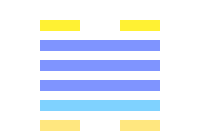
28.3.4.5.6 (28 > 4) - THE TÂ KWO HEXAGRAM.
- 3. The third line, undivided, shows a beam that is weak. There will be evil.
- 4. The fourth line, undivided, shows a beam curving upwards. There will be good fortune. If (the subject of it) looks for other (help but that of line one), there will be cause for regret.
- 5. The fifth line, undivided, shows a decayed willow producing flowers, or an old wife in possession of her young husband. There will be occasion neither for blame nor for praise.
- 6. The topmost line, divided, shows its subject with extraordinary (boldness) wading through a stream, till the water hides the crown of his head. There will be evil, but no ground for blame.
28.3.4.5.6 (28 > 4) - Admitting that one cannot succeed without help
One knows that others have painful things to confess.
Bing DeepL Google Yandex28.3.4.5.6 (28 > 4) - Admitting that one cannot succeed without help
One knows that others have painful things to confess.
Bing DeepL Google Yandex28.3.4.5.6 (28 > 4) - Tá kvoh, le grand excès
Tá kvoh : 1. Grand excès, défaut, manquement ; 2. Traverser, dépasser.
- 3. Une poutre, un pilier trop faible (voir texte I) sont mauvais (ils ne peuvent supporter) (grand défaut).
- 4. Une colonne haute et forte est bonne ; toute autre est dangereuse (opposition à ce qui précède)
- 5. Un vieux saule produisant une fleur, une vieille femme épousant un homme encore jeune, quoique non blâmables, ne peuvent être loués. La fleur du vieux saule ne peut durer, l’époux d’une vieille femme peut s’en dégoûter. (Faits qui passent les règles ordinaires.)
- 6. Traversant un fleuve, y entrer jusqu’au sommet de la tête est chose dangereuse, (mais peut n’être point blâmable, si on le fait pour aider quelqu’un, d’après le Com.) (3e sens). Force défaillante.
28.3.4.5.6 (28 > 4) - Admettre qu'on ne peut pas réussir sans aide
On sait que les autres ont des choses pénibles à avouer.
Bing DeepL Google Yandex28.3.4.5.6 (28 > 4) - Lemondás
- 3. Ápolja kapcsolatait.
- 4. Mások támogatják de még fel kell épülnie.
- 5. Igyekszik javítani mielőtt mások észrevennék a hanyatlást.
- 6. Egyedül akar haladni a környezők gyengesége miatt.
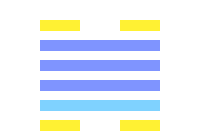
28.1.3.4.5.6 (28 > 41) - THE TÂ KWO HEXAGRAM.
- 1. The first line, divided, shows one placing mats of the white mâo grass under things set on the ground. There will be no error.
- 3. The third line, undivided, shows a beam that is weak. There will be evil.
- 4. The fourth line, undivided, shows a beam curving upwards. There will be good fortune. If (the subject of it) looks for other (help but that of line one), there will be cause for regret.
- 5. The fifth line, undivided, shows a decayed willow producing flowers, or an old wife in possession of her young husband. There will be occasion neither for blame nor for praise.
- 6. The topmost line, divided, shows its subject with extraordinary (boldness) wading through a stream, till the water hides the crown of his head. There will be evil, but no ground for blame.
28.1.3.4.5.6 (28 > 41) - Losing one's essence
One studies carefully the causes of one's decline.
Bing DeepL Google Yandex28.1.3.4.5.6 (28 > 41) - Losing one's essence
One studies carefully the causes of one's decline.
Bing DeepL Google Yandex28.1.3.4.5.6 (28 > 41) - Tá kvoh, le grand excès
Tá kvoh : 1. Grand excès, défaut, manquement ; 2. Traverser, dépasser.
-
1. Ceci est susceptible de deux explications : a. « S’appuyer sur des joncs » est un grand défaut ; ils plient et ne soutiennent pas. b. Pour placer un objet comme natte à offrande, se servir de mao blanc est fautif.
Note. Au lieu de gratter simplement la terre et l’aplanir.
(Le mao blanc représente la pureté, la droiture, kiet tche. Ceci d’après le commentaire représente un excès de précaution. Kwéh hu weï shin (1er sens). - 3. Une poutre, un pilier trop faible (voir texte I) sont mauvais (ils ne peuvent supporter) (grand défaut).
- 4. Une colonne haute et forte est bonne ; toute autre est dangereuse (opposition à ce qui précède)
- 5. Un vieux saule produisant une fleur, une vieille femme épousant un homme encore jeune, quoique non blâmables, ne peuvent être loués. La fleur du vieux saule ne peut durer, l’époux d’une vieille femme peut s’en dégoûter. (Faits qui passent les règles ordinaires.)
- 6. Traversant un fleuve, y entrer jusqu’au sommet de la tête est chose dangereuse, (mais peut n’être point blâmable, si on le fait pour aider quelqu’un, d’après le Com.) (3e sens). Force défaillante.
28.1.3.4.5.6 (28 > 41) - Perdre son essence
On étudie avec attention les causes de sa déchéance.
Bing DeepL Google Yandex28.1.3.4.5.6 (28 > 41) - Lemondás
- 1. Fejlődni akar a gyengeség miatt.
- 3. Ápolja kapcsolatait.
- 4. Mások támogatják de még fel kell épülnie.
- 5. Igyekszik javítani mielőtt mások észrevennék a hanyatlást.
- 6. Egyedül akar haladni a környezők gyengesége miatt.
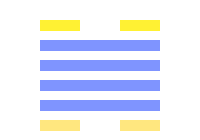
28.2.3.4.5.6 (28 > 23) - THE TÂ KWO HEXAGRAM.
- 2. The second line, undivided, shows a decayed willow producing shoots, or an old husband in possession of his young wife. There will be advantage in every way.
- 3. The third line, undivided, shows a beam that is weak. There will be evil.
- 4. The fourth line, undivided, shows a beam curving upwards. There will be good fortune. If (the subject of it) looks for other (help but that of line one), there will be cause for regret.
- 5. The fifth line, undivided, shows a decayed willow producing flowers, or an old wife in possession of her young husband. There will be occasion neither for blame nor for praise.
- 6. The topmost line, divided, shows its subject with extraordinary (boldness) wading through a stream, till the water hides the crown of his head. There will be evil, but no ground for blame.
28.2.3.4.5.6 (28 > 23) - Stealing one's reputation
One is taking credit for something that belongs to someone else.
Bing DeepL Google Yandex28.2.3.4.5.6 (28 > 23) - Stealing one's reputation
One is taking credit for something that belongs to someone else.
Bing DeepL Google Yandex28.2.3.4.5.6 (28 > 23) - Tá kvoh, le grand excès
Tá kvoh : 1. Grand excès, défaut, manquement ; 2. Traverser, dépasser.
- 2.
- 3. Une poutre, un pilier trop faible (voir texte I) sont mauvais (ils ne peuvent supporter) (grand défaut).
- 4. Une colonne haute et forte est bonne ; toute autre est dangereuse (opposition à ce qui précède)
- 5. Un vieux saule produisant une fleur, une vieille femme épousant un homme encore jeune, quoique non blâmables, ne peuvent être loués. La fleur du vieux saule ne peut durer, l’époux d’une vieille femme peut s’en dégoûter. (Faits qui passent les règles ordinaires.)
- 6. Traversant un fleuve, y entrer jusqu’au sommet de la tête est chose dangereuse, (mais peut n’être point blâmable, si on le fait pour aider quelqu’un, d’après le Com.) (3e sens). Force défaillante.
28.2.3.4.5.6 (28 > 23) - Voler sa réputation
On usurpe un mérite qui revient à quelqu'un d'autre.
Bing DeepL Google Yandex28.2.3.4.5.6 (28 > 23) - Lemondás
- 2. Ha valaki nehézségekbe ütközik, emelje fel a leggyengébbet is hogy megőrizhesse jövőjét.
- 3. Ápolja kapcsolatait.
- 4. Mások támogatják de még fel kell épülnie.
- 5. Igyekszik javítani mielőtt mások észrevennék a hanyatlást.
- 6. Egyedül akar haladni a környezők gyengesége miatt.
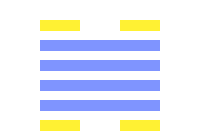
28.1.2.3.4.5.6 (28 > 27) - THE TÂ KWO HEXAGRAM.
- 1. The first line, divided, shows one placing mats of the white mâo grass under things set on the ground. There will be no error.
- 2. The second line, undivided, shows a decayed willow producing shoots, or an old husband in possession of his young wife. There will be advantage in every way.
- 3. The third line, undivided, shows a beam that is weak. There will be evil.
- 4. The fourth line, undivided, shows a beam curving upwards. There will be good fortune. If (the subject of it) looks for other (help but that of line one), there will be cause for regret.
- 5. The fifth line, undivided, shows a decayed willow producing flowers, or an old wife in possession of her young husband. There will be occasion neither for blame nor for praise.
- 6. The topmost line, divided, shows its subject with extraordinary (boldness) wading through a stream, till the water hides the crown of his head. There will be evil, but no ground for blame.
28.1.2.3.4.5.6 (28 > 27) - Offering a wide variety
One completes one's creation with touches of different colors.
Bing DeepL Google Yandex28.1.2.3.4.5.6 (28 > 27) - Offering a wide variety
One completes one's creation with touches of different colors.
Bing DeepL Google Yandex28.1.2.3.4.5.6 (28 > 27) - Tá kvoh, le grand excès
Tá kvoh : 1. Grand excès, défaut, manquement ; 2. Traverser, dépasser.
-
1. Ceci est susceptible de deux explications : a. « S’appuyer sur des joncs » est un grand défaut ; ils plient et ne soutiennent pas. b. Pour placer un objet comme natte à offrande, se servir de mao blanc est fautif.
Note. Au lieu de gratter simplement la terre et l’aplanir.
(Le mao blanc représente la pureté, la droiture, kiet tche. Ceci d’après le commentaire représente un excès de précaution. Kwéh hu weï shin (1er sens). - 2.
- 3. Une poutre, un pilier trop faible (voir texte I) sont mauvais (ils ne peuvent supporter) (grand défaut).
- 4. Une colonne haute et forte est bonne ; toute autre est dangereuse (opposition à ce qui précède)
- 5. Un vieux saule produisant une fleur, une vieille femme épousant un homme encore jeune, quoique non blâmables, ne peuvent être loués. La fleur du vieux saule ne peut durer, l’époux d’une vieille femme peut s’en dégoûter. (Faits qui passent les règles ordinaires.)
- 6. Traversant un fleuve, y entrer jusqu’au sommet de la tête est chose dangereuse, (mais peut n’être point blâmable, si on le fait pour aider quelqu’un, d’après le Com.) (3e sens). Force défaillante.
28.1.2.3.4.5.6 (28 > 27) - Décliner une gamme
On parachève sa création par des touches de différentes couleurs.
Bing DeepL Google Yandex28.1.2.3.4.5.6 (28 > 27) - Lemondás
- 1. Fejlődni akar a gyengeség miatt.
- 2. Ha valaki nehézségekbe ütközik, emelje fel a leggyengébbet is hogy megőrizhesse jövőjét.
- 3. Ápolja kapcsolatait.
- 4. Mások támogatják de még fel kell épülnie.
- 5. Igyekszik javítani mielőtt mások észrevennék a hanyatlást.
- 6. Egyedül akar haladni a környezők gyengesége miatt.

